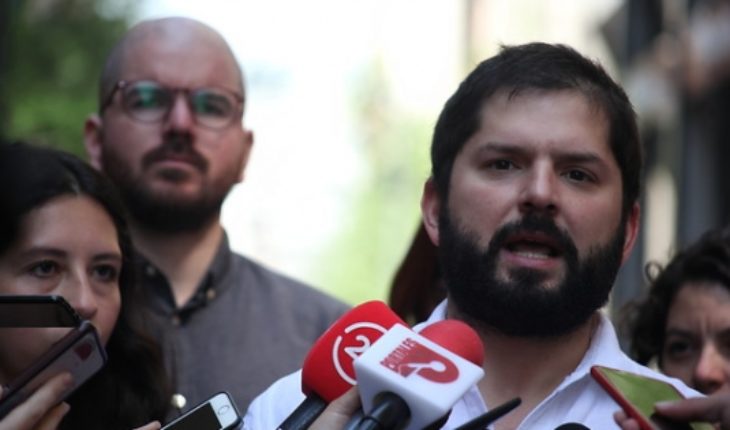October 18 marked a turning point in the country’s reality. The impact of the social outburst has been such that it not only created the social pressure to start the process for a new Constitution, but also tested how much political forces, their leaders and leadership are in dealing with the complex national situation. In light of the demands to correct inequalities and challenge the institutional political world, everything indicated that the Broad Front – born as a reaction to the crisis of politics and rooted in the social movement – would have the skills to sailing with better compass these two months, but in practice the coalition has ended up fractured and agonizing.
Over the past two months, the coalition has been sweenful by breaks and strong criticism of the role played by its parliamentarians. The signing of the November 15 agreement for a New Constitution sparked resignations and the “funa” – in several organized social spaces – to one of its main references, Beatriz Sánchez. Thus, criticism of the Broad Front these days ranges from the coalition to the “politics of the same as always” until “it has not lived up to the times.”
The last tension occurred yesterday in the chamber of the Chamber of Deputies. The official’s move to reject the indications for gender parity, indigenous seats and equality for independents, left between the sword and the wall to the side of the Broad Front, whose deputies repeated lyre again and again that there would be no agreement without those three points incorporated. The vote was divided: the meaofa of Comunes, Camila Rojas and Claudia Mix, plus the bench of DR – minus MEP Maite Orsini – chose to vote in favor of the agreement establishing the plebiscite for April 26, while the Social Convergence bench More Orsini abstained, except Mr Gabriel Boric.
Split vote that adds to that of the President’s Public Security project, Sebastián Piñera, which was generally approved by Social Convergence and Democratic Revolution, while in Commons they were obtained. Social organizations sought them out as “traitors” and to support an agenda that would criminalize the social movement. Such was the internal noise that this episode generated, that part of Social Convergence left the party, just like in RD, which brought with it “tense hours inside”.
But “the most painful thing,” they say from the FA, was the resignation of the Humanist Party, which left the coalition. “He left us lame,” they recognized on the Broad Front. The PH split was sreached following the signing of the constitutional agreement on 15 November. Comunes and RD were the signatories as parties, the humanists subtracted theself and although the president of Social Convergence, Gael Yeomans did not sign, The Deputy Boric filed his name among the party presidents that night. This led to the resignation of the mayor of Valparaiso, Jorge Sharp, to his militancy, the departure of Equality of the Broad Front and began a real internal battle with the most left-wing groups in social organizations, which often expelled them even from the Assemblies.
In this panorama is added the figure of the member Pamela Jiles, who generates welts in the FA and has been one of the main criticisms of the actions of parliamentarians such as Giorgio Jackson and Boric.
At this point, the question that is around the coalition is how much is left alive from the original Project of the Broad Front, which began at the end of 2016 and crystallized into a massive meeting in 2017, the same one that won a large seat – 20 seats in the lower house and one in the Senate — in his first election, he soon made his debut in Congress was accused of losing the connection with the social movement, “with the street, with the people.”
The organizations that have stayed behind these two scrambled and intense months are Democratic Revolution, Common Revolution and Social Convergence (pirates are in the process of reflection) and today they say that the mood “is calmer to the internal”, that the pace of work.
For the president of the PH, Catalina Valenzuela, the Broad Front “fulfilled its process as a project, that this will not last as long as she imagined is something else, but it is not uncommon considering the acceleration of social processes”. He insisted that the breaks do not reveal a failure, but “fulfilled their goal, 20 deputies arrived a senaturía and a leadership for presidential, unthinkingly in their first 18 months of existence, that is already worth it as a project”. He added that “another very different thing is to have the ability to assume and adapt to profound social changes, which have to do with a change of era and is reflected globally, there what we lack is humility and to understand that every thing has its time and nothing and no one is to impr scindible. We have to open up the spaces to those who come.”
The director of Node XXI, Camila Miranda, stressed that “the FA was high in the context of a general crisis of politics. The difficulty in agreeing and sustaining them together beyond the daily wedge, together with the multiple external pressures, has shown an uncoherent force.” He said that “it is not a phenomenon that can only be attacked by the FA, the crisis of the parties with a high parliamentaryization of their chores had been deepening before the outbreak”.
Miranda stated that in a relatively new force “where there were experiences of organizations in formation (several from student mobilizations) and traditional parties (with a long history of electoral alliances), the weakness of collective deliberation and resistance to discussing common project (rather than program) to give depth to an alternative, ends up expressing itself in the recent exodus”.
For the conglomerate’s former presidential pre-candidate, Alberto Mayol, who is no longer frentamplista, the emerging space lost “his political discourse and central political project, which is to represent opposition to transition and neoliberalism. The parliamentizing of the coalition, marked by DR’s leadership, would have led them to be servile to those same ideas that they rejected.”
The sociologist stated that “repentants migrate, cannot compete with RD and have no longer disputed the hegemony of the FA”, which he , he said, brings with it a very small picture of possibilities of the Broad Front. A concern that would be in place among the forces that remained, including Mayor Sharp, since although he resigned with part of his team to The Convergence, remains part of the coalition.
Inside the Broad Front they recognize that this time has been a “painful” process, but that after the “depuration” of the forces, the positions have become clearer and with whom you can work. Although the frictions are in full bloom and FA mPs have been seen on several occasions having discussions in the Chamber of Deputies, there is still hope that some forces will return to work in the future.
Some FA leaders made the point that the conflicts they have experienced have, above all, their raison d’ereason “in egos” and in the fact that “politics was abandoned,” to the point that “no one asks for forgiveness, no one gives in, no one recognizes mistakes.” They said the main culprits would be “the policy of RD, Boric, Sharp and Jiles.”
History condemns them
There are several stories of breaks among broad front organizations, so much so that it seems to be part of the DNA of the younger center-left forces. Only in recent history is the break of the Autonomous Left in May 2016, which ended up giving life to the Autonomist Movement, led by Boric and a then unknown Jorge Sharp, who months later was elected mayor of Valparaiso, giving rise to the mayor’s office with La Matriz, an organic that also went bankrupt with the MA team working in the municipality.
This conditioned the origin of the frenteamplism. Left Autonomous put together a block together with Poder and the Green Environmentalist party, in response to the talks RD had with other organizations that once shared the leadership of the student movement in the so-called Driving Bloc, in which there was New Democracy, Libertarian Left and Socialism and Freedom (SOL), two last organizations that had had their own break time before.
In January 2017, the Broad Front brought them all together. Much of them shared militancy since the so-called “Sin Fech”, an organized bloc that balanced the forces within the 2011 Student Movement, in the face of the alliance between the Communist Youth and the New University Action (of the UC), personified in Camila Vallejo and Jackson.
To that sector – which had a more student origin composed of AI, MA, RD, ND, SOL and IL – were joined forces with more years of history, becoming 12 organizations at first. There was “fundamental entry of the humanists”, they stood out from the conglomerate, since the party of MR Tomás Hirsch was the only one with a national presence and together with Equality, they had more political experience. “The PH became the FA’s main game in the first year,” they added.
That lasted shortly. After the presidential and parliamentary elections in October 2017, the party that became most empowered was the Democratic Revolution, which was then led by Sebastian Depolo, a possible candidate for GORE by the RM by 2020. RD not only managed the largest bench on the front ampnosm with seven deputies, but was the electoral tool to legally support Beatriz Sánchez’s presidential candidacy.
Not only that, in Congressthey also said that “RD maintained a monopoly on relations with the former New Majority, the first year”, that through the duo Boric and Jackson.
During 2018, various processes of dialogue were initiated between movements of the Broad Front, in order to join forces, mergers were consolidated, one of them that of the Autonomous Left with the Power Party, which gave rise to the Common Party, which has the MPuts Mix and Rojas.
More tortuous has been the path for Social Convergence (CS), although from within they assured that “peace has returned to the party”. It emerged from the merger between the Autonomist Movement, the Libertarian Left, the SOL and the New Democracy, which had also suffered a break that led to part of its militancy to the Democratic Revolution. It was formed on the basis of three theses, proposed by the “small group” in which the deputy Boric and Gonzalo Winter are, the “sharpism” and a proposal identified with the member Diego Ibañez.
The movement, which is chaired by MEP Yeomans, is one of the most successful after the October outbreak, mainly by Boric’s signing in the November 15 deal. From La Convergence they stated that “there were previous reasons”, from Sharp’s circle they emphasize that the MP for Magellan made “a profound mistake, which passes the count to this day”, in addition to “going over the will of the party”. Added to this was the departure of the Libertarian Left, although Yeomans remained with his team and other militants in the organization.
Within the Democratic Revolution there have also been exits, mainly from the most left sectors, some since in particular MS Rs. Jorge Brito and Orsini encouraged general approval and an indication of the proposed Security Act by the government. The lack of internal agreement led the president of the bench, Pablo Vidal, to leave his post, which was assumed by the president of RD, Catalina Pérez, and after a series of critics, Orsini and Brito sent a letter calling for freedom of action for the RD bench in est and theme. On the other hand, from Social Convergence they assured that the error in the vote is the responsibility of the presidencies of RD and CS, which would have been Yeomans and Pérez who would have agreed to approve the project in general, a move to which Common , but he eventually abstained.
With and without
After the last two months, on the Broad Front they affirmed that now the coalition moves to “a new, more mature stage” It is composed of the historical organizations of this renewed left, linked to the student movement, such as RD, Social Convergence and Common Party. On the frontampevensm they even joke that now they are few and therefore they can talk better: “there are no more problems, we always agree”.
Sharpism is trying to rearm. Now after the citizen consultation, they would put “hands on the job” to build bridges and reflect with other forces. So far, they would be the only link with the Communist Party and the Humanist, as the rest would have a kind of “war” declared with part of the PC and especially with the figure of the mayor of Recoleta, Daniel Jadue.
For Mayol, the truth is that “the FA is completely out, the current reaction has no relation to the original target of the block. Leaderships like Beatriz Sánchez’s gethurt significantly in this process, he looks very complex, Boric also comes out with several complex elements, although Jackson pays costs, at the same time gets rid of those who never agreed that Were. Jorge Sharp is a big mystery, he’s the only one with the most relevant political work capacity, but he hasn’t launched a movement yet.”
The director of Node XXI stressed that after the crisis there is “an opportunity to think collectively about her future, the constitutional debate that requires thinking about the way out of neoliberalism can be key to encouraging collective discussion and thinking project, the clock runs . Leaders need to be made available to collective resolutions, even if their times are different from congressional daily debate. He added that “the constituent situation will also be the scene of new groupings and representations, in that context also the future as FA can be open.”





